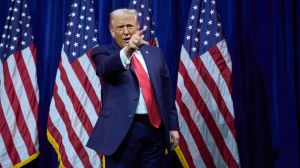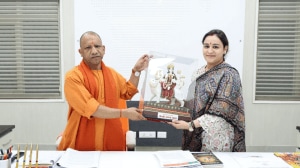Red carpet for Iran
India seems to be laying out the red carpet for Iran, with arch-conservative and judiciary chief Hashemi Shahroudi receiving the right royal...

India seems to be laying out the red carpet for Iran, with arch-conservative and judiciary chief Hashemi Shahroudi receiving the right royal treatment from not only his host, Chief Justice V N Khare, but also meeting PM Vajpayee and President Abdul Kalam. Tipped to succeed the Supreme Leader in Iran, Ali Khamenei, Shahroudi was preceded in New Delhi by National Security Advisor Hasan Rohani. Apart from the fact that both reformers and conservatives in that country are looking at New Delhi with renewed interest, fact remains that Teheran is seeking India8217;s support in the IAEA against the nuclear non-proliferation scandal that threatens to engulf Iran in the wake of the A Q Khan episode. Even more interesting, New Delhi continues to reserve opinion, diplomatically pointing out that most resolutions in the IAEA are carried by unanimous vote.
Forty-five years of exile
The Tibetan Government-in-exile marks 45 years of the 1959 Tibetan uprising against the Chinese on March 10, tomorrow, with an 80-strong Tibetan Youth Congress yatra from Dharamsala joining protests outside the Jantar Mantar in Central Delhi. A week from now the 8216;Kashag8217;, or the Parliament of the Government-in-exile, will begin its seventh session on March 17 which also marks the 45th anniversary of the Dalai Lama8217;s arrival in Bomdila, and is expected to debate the fragility of the current historical moment. On the one hand, Beijing has allowed two delegations of Tibetans to visit China over the last 18 months and hold two rounds of 8216;8216;talks about talks8217;8217;, even as a Tibetan-in-exile request for a third round has met with resounding silence.
Chinese Foreign Minister Li Zhaoxing told a news conference in Beijing last week that the door to talks with the Dalai Lama is always open, on the condition that he renounces 8216;8216;independence8217;8217;. The Tibetans point out that option was given up over a decade ago. Meanwhile, youth activists are beginning to strain at the leash imposed a year ago, asking them to refrain from violence in public protestations.
Russian PM8217;s ties with India
Russia8217;s newest Prime Minister Mikhail Fradkov began his career as a junior diplomat in the Soviet Embassy in New Delhi in the mid-8217;70s and has since retained an affection for India. In the early 8217;90s, Indian journalists and embassy officials would often be pleasantly surprised by the very warm Fradkov, as he contrasted so vividly with the nouveau Russians that had overtaken Moscow. Starting off as a Deputy Minister in the Ministry of Foreign Economic Relations, Fradkov became the Deputy Co-chairman of the Indo-Russian Joint Commission in the mid-8217;90s and was instrumental in pushing the rupee-rouble debt arrangement through Moscow8217;s bureaucratic corridors. With equal ease he would turn up at the meetings of the fledgling Indian Business Association that began at the same time. As the 12-year-old rupee debt expires in 2005, old-timers remember how Fradkov would help sell things like tea, tobacco and soya that Indian businessmen wanted sold in Russia.
What the Dalai said
There8217;s no clear link that connects the Dalai Lama with the Chinese, but often it seems as if the thread8217;s palpable. At the international Buddhism conference held in the Capital a month ago, where the keynote address was delivered by the Dalai Lama, Beijing was said to be quite nervous about what the Tibetan leader was going to say. New Delhi was asked to ask him to withdraw from the conference, but the MEA reassured the Chinese that in his capacity as a 8216;8216;spiritual leader8217;8217;, he would not overstep his brief. The Dalai Lama lived up to Delhi8217;s expectations. The Chinese seem to be quite happy with the result.
MEA creates a special post
Remember Vijay Kumar, India8217;s former high commissioner to Mauritius who was unceremoniously 8216;8216;posted8217;8217; to Zimbabwe last year because of certain inquiries launched against him during his tenure in Port Louis? And how he stayed on and on in Delhi, hoping he would be forgotten in the myriad corridors of South Block? At the risk of single-mindedly following his career, it turns out that Kumar has gotten himself out of going to darkest Harare and that Ajit Kumar, India8217;s consul-general in Durban, has been posted there instead. Additional Secretary Vijay Kumar will now handle the 8216;8216;Records8217;8217; division, a job that seems to have been created especially for him in the MEA.
- 01
- 02
- 03
- 04
- 05































